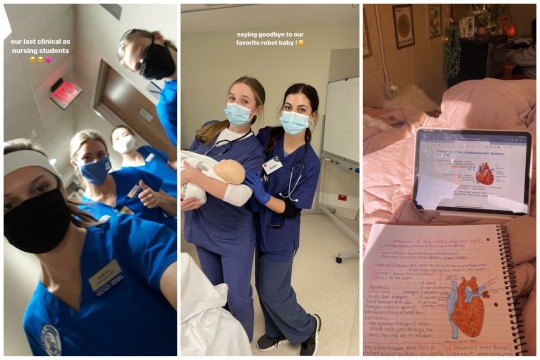#nclex study programs
Explore tagged Tumblr posts
Text

Navigating Your NCLEX-RN Path with Pro Med Prep
Earning your nursing degree marks a significant milestone, but the NCLEX-RN exam stands between you and your licensure. At Pro Med Prep, we offer a meticulously crafted NCLEX study plan, a wealth of resources, and dedicated support to ensure you’re thoroughly prepared to excel in the exam and embark on your nursing career with confidence.
#nclex exam preparation classes#nclex study programs#nclex test prep online#nclex prep simple nursing#nclex prep course online#nclex online courses#nclex rn exam prep#nursing online courses#rn exam preparation course#online classes for nclex rn
0 notes
Text
thank you, nurse ! | lando norris x nursing student! reader
summary; everyone thought it was strange yn never made it to races until it’s finally revealed why
fc; belajuliana_
note; as a future nursing student, i needed this
nclex is the exam you take after finishing the nursing program to become a registered nurse !!!!
masterlist !



liked by landonorris, bsfusername, and 120,038 others!
yourusername: post-night clinicals, at least it was w bsfusername !
bsfusername: we better get on our professors good side after doing night clinicals 3 weeks in a row😒😒
yourusername: night clinicals are a vibe
bsfusername: they really are especially with a mcdonald’s iced coffee
yourusername: ‘murica 🦅🦅
username: omg
username: SHES A NURSING STUDENT
username: so pretty omg
landonorris: nurse help!! i’m hurt, i think you need to check it out 😏😉
yourusername: i’m not registered yet sorry😕😕😕
landonorris: babe, pls play along 💔💔
yourusername: SORRY BABE, i can heal u quickly 😉
username: she’s pretty, smart, and helps people in need , she really got y’all
username: clinicals are NO joke, no wonder she couldn’t make it to any races

liked by username, username, and 349,937 others!
f1wags: Lando Norris and his girlfriend, Y/n L/n, were spotted at dinner just 2 days before the Silverstein Grand Prix!
username: the way she looks at him🥹🥹
username: everyone doubting her love for him when she smiles at him like THAT
username: he deserves better
username: like you?? LMFAOO
username: they’re so cute what


liked by yourusername, oscarpiastri, and 1,748,927 others!
landonorris: P2 and a 🏆 at my home race !!!!!!!! ❤️you guys are crazyyyyyyyyy 💙 extra thank you to my favorite nurse for nursing me back to health 💓💓
tagged; yourusername
yourusername: do not be fooled everyone, it was just a cut which i healed with a hello kitty band aid!
landonorris: like i said, thank you, nurse !
yourusername: so so so so proud of u🥹🥹
liked by landonorris !
username: lando p2 is everything
username: LANDO PODIUM AT HIS HOME RACE!!
mclaren: 🧡
username: he fr loves her
username: ‘my favorite nurse’ ME AND WHO😫😫
username: the clip of her in mclaren’s garage🥹

liked by landonorris, oscarpiastri, and 394,038 others!
yourusername: p2 for my love 🧡🧡 so unbelievably proud of you! here’s to many more podiums! i love you so much🧡🧡
tagged; landonorris
landonorris: AWHHH
landonorris: i love you so much , thank you for being my lucky charm and for nursing me back to health w my paper cut🧡🧡🧡💓💓💓
yourusername: i’ll nurse you back to health anytime 💗💗
oscarpiastri: don’t let lando fool you he squealed
yourusername: when doesn’t he squeal
username: omg they’re so cute
username: laying on the highway tonight
username: i want to know what manifestations yn did bc they’re ADORABLE
yourusername posted to their story !



liked by yourusername, bsfusername, and 1,203,938 others!
landonorris: guess who is dating an official!! registered pediatric nurse!!!! congratulations on passing the nclex my love. so proud of you for making it through nursing school. i love you so much, Y/n L/n R.N.
tagged; yourusername
yourusername: couldn’t have done it w/o our facetime sessions 🥹🥹
landonorris: making sure you study hard, R.N!!
yourusername: R.N. does sound nice 😌
yourusername: i love love love love you!!!!
landonorris: and i love love love love love you!!!
yourusername: happy to nurse my favorite driver back to health any day
landonorris: searching up on how to purposely get sick 🧐🧐🧐🧐
username: OMGOMGOMG
username: she was busy in nursing school that’s why she couldn’t visit 😫😫
username: she helps KIDS you can’t hate her 😫
username: idk if i want him or her
oscarpiastri: congrats!!! now can you visit lando more often so i don’t have to hear him whining all the time!!!
yourusername: i’ll try😌
landonorris: i don’t whine that much !!
carlossainz55: enhorabuena! [congratulations]
yourusername: gracias ❤️🧡 [thank you]
username: lando’s girlfriend being a nurse is everything
username: lando won the lottery omggg
#formula one imagine#formula one x reader#f1 imagine#f1 x reader#f1 fanfic#formula one imagines#lando norris x reader#lando norris x y/n#lando norris imagine#formula one social media au#f1 smau#smau#f1 scenario
3K notes
·
View notes
Note
I re-read your Fellow Honest study, and one thing to mention is that Riddle is immensely proud of having no one drop out or transfer out of Heartslabyul/NRC, right? His dorm is the only one at full capacity? This means dropping out of NRC isn't that uncommon, whether it's a money issue or a grades issue, and that's more people discarded simply because they couldn't keep up.
[Referencing this analysis!]

Mmm, that's true 🤔 I wonder how NRC's dropout rates compare to those of other magic schools and regular schools that do not train mages... I can't imagine that NRC has a ton of dropouts though, because otherwise I feel like more dorm leaders and staff would express concern about it? Like if a ton of students were dropping out, it would reflect poorly on their leadership and teaching skills, wouldn't it...? Maybe it's not mentioned because it isn't that relevant to the main story or Riddle in particular is super fixated on it (given how strict he is). At the very least, we know that NRC has a non-zero dropout rate. Even at a school that supposedly has the best and brightest mages-in-training, some will not make the cut.
As cruel as this may sound (sorry, Fellow), it's 100% understandable from a school's perspective why they wouldn't want to keep supporting students who continuously do not succeed and ultimately dismiss them. Many programs irl (especially those in higher education) set standards that students must meet and maintain until graduation if they want to remain in their program. It could harm the school's educational reputation if they do not produce "results".
In some cases, schools that fail to maintain a certain "pass" rate on specialized exams their students take may lose accreditation (an official “quality seal”) for their program(s). For example, irl nursing programs in the U.S. and Canada are put on probation if they have a class of students with an 80% or lower passing score on the NCLEX exam. They are given 2 years to "fix" this low passing rate; if this is not corrected, then the school's accreditation is revoked completely. A loss of accreditation can result in many other negatives, such as less financial aid dispersement and fewer job opportunities (/your diploma not being seen as “legitimate”).
That's unfortunately how it works. Granted, a school shouldn’t spite a student for not being able to keep up with the workload (which sadly may have been the reality for Fellow), but it really is in the institutions’ best interests to drop a student they fear won’t perform well.
#twisted wonderland#twst#notes from the writing raven#disney twisted wonderland#disney twst#Riddle Rosehearts#Fellow Honest#Ernesto Foulworth#Gino
109 notes
·
View notes
Note
i’m a pre-nursing student! any advice? :)
sorry for the late reply! i don't know what a pre-nursing program entails exactly but here's some general advice for nursing school:
1. keep a detailed calendar. there's going to be 1001 different things due so it's very easy to lose track of things. time management will save your mental health.
2. make some nursing friends in the first semester. it's good to have a little group to study with/vent.
3. you're probably going to fail a couple of exams. it's not the end of the world and that doesn't mean nursing is not for you.
4. if possible, maybe shadow a nurse? working as a nurse and being in nursing school is two completely different things so having some experience in the field beforehand is great.
5. whenever you can during nursing school, become a CNA (certified nursing assistant) if possible. the experience makes all the difference when you finish nursing school and it's easier to integrate the workplace.
6. use all any extra lab time you can get to practice skills because you might not be able to once you start clinical rotations at the hospital.
7. BUY SECONDHAND BOOKS! (your bank account will be grateful).
8. be prepared for tricky exam questions and lots of critical thinking exercices. it's okay to suck at them, i had the worst time with the multiple-choice quizzes. practice exams online are a great way to study. registerednurseRN on youtube is also a good resource to use.
9. nursing school is basically there to prep you to think like a nurse but not so much work as one. having a hard time at school ≠ being a bad nurse. all of it is really just prep work for the NCLEX. i found that working as a nurse is actually easier than being a student so there is light at the end of tunnel lol.
10. take some breaks often. nursing is a really demanding program to be in and you should take care of yourself as much as you can throughout (or else how could you fully take care of others 😊)
15 notes
·
View notes
Text




so the tags on the last post brings up some very valid concerns about the state of healthcare workers but like. as a healthcare worker myself i wanna share my experiences in medschool.
the program i graduated in, graded purely only on test scores. any assignments they gave us usually was just some extra credit points on our next exam, or sometimes the assignment (if given remotely) only counted towards attendance. it didn’t affect your grade. and like tbh im not really sure how exactly ChatGPT is going to help you out on these exams, especially the NCLEX.
the NCLEX is an exam given to nursing graduates to test their clinical judgment, honestly i would say it tests how much of a safe nurse you would be. it gives you a lot of case studies and scenarios that you need to learn how to analyze, and know what your next move is.
plus AI could NEVER replace clinical hours. on rare occasions did they give us some remote learning clinical program, that gave a simulation with a patient scenario and it graded you based on the actions you did. and no that didnt even count into our clinical hours lol. we went to various long term care facilities, hospitals, and family clinics in order to practice procedures (with the assistance of an instructor ofc)
so uhh TLDR someone using ChatGPT in medschool likely will not get very far into their program when at the end of the day we are tested on our clinical judgement, that AI could never replace.
#istina.txt#now i will say there is a HUGE empathy problem in healthcare but thats a tangent for another day tbh#istina.rants#also i graduated with honors if thats relevant 🤓#also im aware not every nursing school is very strict#unfornately very many schools are very much profit first education second#im grateful to have gone to a very good school w excellent instructors
2 notes
·
View notes
Note
obviously im biased but i think if your hearts really set on it or even just considering it you could enroll at your community colleges associates program for nursing ^_^ im not sure how competitive they are right now because im going for a bachelors and not an associates but i can say from my firsthand college admission experience is that once you get in you reallt have to rush to put down that deposit fee so you don’t lose your spot . though i don’t want to sugarcoat and say it’ll be easy because it’s not it’s really hard and i can only imagine condensing four years worth of material into a two year program can be even harder ( nursing school acts as a functional way to prepare you for the NCLEX btw . you get your actual experience on the floors when you have a job and during clinical rounds . ) if you want a little slither of a taste of notes these were my cardiovascular notes

though im also really bad at keeping things concise so this one is probably a me issue . i do understand how the heart beats now though
Yeah the thing that stops me in addition to "gets squirmy around injuries" is "it's hard". There's a lot of things I've wanted to do in life, like I've joked before that if I was in a cartoon I would be a journalist by now because in 10th grade my english teacher was begging me to join newspaper club, took a career class and interviewed a local newspaper journalist for it and felt at home in the building, have had multiple community college professors encourage me to continue on as a journalist at the nearby [big university in Washington State] campus, that sort of thing where it looks like the dominoes are lining up. Or ever since I was a kid I've wanted to be a librarian but that requires a Master's. Or be a clown or actor but that's such a narrow field AND the social anxiety outweighs it now. Or zoologist/marine biologist/some guy studying animals but again, bigger degree. OH I forgot about psychologist when I was younger too. But yeah it's like so much time needs to go into these (okay maybe not clown) to the point I'm like "why should I try when I keep changing my mind" so I stick with my basic entry level manual labor job and hope by some miracle i save enough money to be able to live off savings with my besties in a house together
#asks for sky#mahkari#sorrh that got heavy i should probably go back to sleep since the pain meds are working right now#i will keep your words in mind though. i wish there was like. a trial class i could take to learn basics#i think in the perfect world my dream job is professional student/jack of all trades :)#i get to learn as much as i want and then bedazzle people with my knowledge. maybe even apply it when the time calls for it#and theres no expectations for me to turn it into a career because hey! my job is to just learn! yup thats perfect for me
2 notes
·
View notes
Text
This comprehensive guide will help you to accelerate your nursing career
As a result of modern healthcare requirements, the nursing field is evolving rapidly. As healthcare needs increase, more Licensed Practical Nurses wish to become Registered Nurses. The 6 month lpn to rn program. This concise but detailed guide will show LPNs how to make a career change.

LPNs seeking to be RNs in a short time can benefit from the LPN to RN Bridge Program. The curriculum is designed to help LPNs get ready for the high-speed field of registered nurses by improving both their theoretical and practical understanding. The curriculum provides LPNs with advanced nursing and critical thinking abilities.
This 6-month LPN RN curriculum can be challenging, due to the short length. The curriculum covers the basics in depth. These include nursing in pharmacology and pediatrics. To prepare students to become multifaceted RNs, the program emphasizes evidence-based nursing practice, patient management skills, nursing management and leadership.
There are prerequisites for the LPN-toRN expedited curriculum. A valid LPN licence and some work experience are required by most schools. It is necessary to pass microbiology, anatomy and physiology with at least a B-grade. LPNs need to confirm the school requirements.
Although the six-month program might seem long, it is designed specifically for LPNs. LPNs with busy schedules or online classes can study while working at colleges. LPNs are able to achieve RN status without sacrificing their jobs or other obligations.
A significant advantage of this program is that it accelerates the nursing career. Graduates may take the NCLEX. If you pass this exam, your LPN status will be upgraded to RN, allowing for more career opportunities and higher earning potential.
It is not for everyone. Fast-paced courses require motivated students with dedication and talent. It is important to evaluate your readiness and commitment before enrolling in the Fast Track.
RNs specialize in a number of different healthcare fields. They also have the ability to manage, supervise, and improve patient care. Being an RN requires a dedication to ongoing study, professionalism and improvements in healthcare.
Beyond personal and career growth, a LPN to RN 6-month curriculum offers many benefits. RNs, with their broader practice scope and enhanced abilities, are valuable healthcare professionals. RNs also have a higher level of job security, and can advance their careers faster than LPNs. RNs are also paid more and the program makes sense.
Due to its expedited pace, the six-month program requires students to fully commit to their studies. It is a demanding course that requires discipline, time management and solid study habits. There are many schools that offer help to manage the workload of students.
The LPN program to RN is a 6-month course that promotes professional nursing networking. Interaction between students and instructors helps to foster teamwork.
2 notes
·
View notes
Text
Opening Your Nursing Career: Essential Insights into Board Registered Nursing
Unlocking Your Nursing Career: Essential Insights into Board Registered Nursing
Unlocking Your nursing Career: Essential Insights into Board Registered Nursing
nursing is not just a profession; it’s a calling that requires dedication, compassion, and a continual thirst for knowledge. As a registered nurse, your role is pivotal in the healthcare system, making a positive impact on patients’ lives. If you’re looking to enhance your nursing career, understanding the nuances of Board Registered Nursing (BRN) is crucial. This article dives deep into essential insights, tips, and experiences that can help you successfully navigate your nursing career.
Understanding Board Registered Nursing (BRN)
Board Registered Nursing refers to the registered nursing licence you obtain after passing the National Council Licensure Examination (NCLEX-RN). Here are the core aspects you need to know:
Education Requirements: Most aspiring RNs will need either an Associate Degree in Nursing (ADN), a Bachelor of Science in Nursing (BSN), or a diploma from an approved nursing program.
NCLEX-RN Exam: The NCLEX-RN is a standardized exam that tests the knowledge, skills, and abilities essential for safe and effective practice as an entry-level nurse.
State Licensing: After passing the exam, you will need to apply for a nursing license through your state’s nursing board.
Benefits of Becoming a Board Registered Nurse
Obtaining your BRN opens doors to an array of career opportunities. Below are some notable benefits:
Diverse Career Paths: As a BRN, you can choose to work in various healthcare settings, such as hospitals, clinics, and schools.
Job Security: The demand for RNs continues to grow, providing a solid job outlook and security within the profession.
Competitive Salaries: registered nurses earn competitive salaries, which can considerably increase with experience, specialties, and advanced degrees.
Opportunities for Advancement: Further education can lead to advanced practice roles such as Nurse Practitioner or Nurse anesthetist.
Essential Insights for Your Nursing Career
1. Thoroughly Prepare for the NCLEX-RN
Preparation is key in passing the NCLEX.Here are effective strategies:
Utilize reputable study materials, including NCLEX prep books and online resources.
Join study groups to share knowledge and gain diverse insights.
Take practice tests to familiarize yourself with the exam format.
2. Expand Your professional Network
Networking can propel your nursing career to new heights:
Attend nursing conferences and workshops.
Connect with fellow nurses on social media platforms like LinkedIn.
Join nursing associations to meet mentors and peers in the field.
3. Seek Specialization
Consider pursuing certifications in specialty areas, such as:
Pediatrics
Oncology
Critical Care
Specializing not only enhances your skills but can also lead to higher salaries and job satisfaction.
4. Continuous Education and Lifelong Learning
The healthcare landscape is constantly evolving. Stay up-to-date by:
Participating in Continuing Education Units (CEUs).
Attending workshops and training sessions.
Reading nursing journals to understand new trends and practices.
Case Studies: Real-Life experiences
Case Study 1: Transitioning from ADN to BSN
Maria, a nurse with an ADN, decided to pursue a BSN. She found that this transition not only elevated her knowledge but also provided opportunities for leadership roles and better job prospects. Maria notes, “The journey for further education was challenging, but it ultimately opened so many doors for me.”
Case Study 2: The Impact of Specialization
John, a registered nurse who specialized in Critical Care, shares his experience: “Getting certified in critical care was a game-changer. I had access to more challenging positions, and the salary increase was meaningful.”
First-Hand Experience: Insights from Nurses in the Field
We spoke to several nurses to gain insights into their experiences:
Emily, RN: “Building relationships with patients is the most rewarding part of my job. You’re not just treating a condition; you’re making a difference in their lives.”
Jason, BSN: “The profession demands resilience. You’ll face tough days, but the rewards far outweigh the challenges.”
Practical Tips for Aspiring Nurses
Stay Organized: Utilize planners and digital tools to manage your study schedules and career goals.
Develop Soft Skills: Focus on improving communication, empathy, and critical thinking skills.
Find Balance: Maintain a healthy work-life balance to avoid burnout.
Conclusion
Unlocking your nursing career through Board Registered Nursing is a journey filled with challenges and rewards. By receiving the right education, connecting with others in the field, and dedicating yourself to lifelong learning, you can enhance your skills and open doors to incredible opportunities. Whether you’re just starting your nursing career or looking to advance, remember that your journey is unique, yet filled with potential for growth and success.Embrace the path ahead and make a lasting impact on the lives you touch as a registered nurse.
youtube
https://nursingcertificationcourses.com/opening-your-nursing-career-essential-insights-into-board-registered-nursing/
0 notes
Text
Open Your Career: A Step-by-Step Guide to Obtaining Your Arkansas CNA License
Unlock Your Career: A step-by-step Guide to Obtaining Your Arkansas CNA Licence
If you’re looking to kickstart your career in healthcare, obtaining your Certified Nursing Assistant (CNA) license in Arkansas is a fantastic start. This guide will provide you with a detailed, step-by-step approach to achieving this goal while highlighting the benefits and offering practical tips along the way.
What is a CNA?
A Certified Nursing Assistant plays a vital role in the healthcare system. CNAs provide essential services to patients and residents in various settings such as hospitals, nursing homes, and home health care. Their duties typically include:
Assisting patients with daily living activities
Monitoring vital signs
Helping patients with mobility and ambulation
Providing emotional support to patients and families
Why Obtain Your Arkansas CNA License?
Choosing to become a CNA can provide you with numerous advantages:
High Demand: The healthcare industry is continually growing, leading to an increasing demand for CNAs.
Entry-Level Position: Becoming a CNA requires minimal education compared to other healthcare roles, making it accessible to many.
Foundation for Advanced Roles: The experience gained as a CNA can lead to further education and opportunities in nursing or other healthcare careers.
Requirements to Obtain a CNA License in Arkansas
Before diving into the steps, it’s essential to understand the basic requirements:
You must be at least 18 years old.
You need to have a high school diploma or GED.
A clear criminal background check is mandatory.
You must complete an approved CNA training program.
Step-by-Step Guide to Obtain Your Arkansas CNA License
Step 1: Complete a CNA Training Program
Finding an accredited CNA training program in Arkansas is your first step. Programs are available at community colleges, vocational schools, and nursing homes. Ensure the program is approved by the Arkansas Department of Human Services (DHS).
Step 2: Pass the Course Exams
Following the completion of the training program, you must pass all the course exams to demonstrate your knowledge and competency in essential nursing skills.
Step 3: Apply for State Certification
After passing your exams, you can apply for your CNA certification through the Arkansas DHS. You’ll need to submit:
Proof of completion of the training program
Proof of passing the exam
A completed application form
The application fee (around $25)
Step 4: Schedule and Pass the NCLEX-CNA Exam
The next step is to schedule and pass the National Nurse Aide Assessment Program (NNAAP) exam, which includes a written portion and a skills test. It’s crucial to prepare adequately for both sections.
Step 5: Receive Your CNA License
Once you have successfully passed the NNAAP exam, you will receive your CNA license. This will allow you to work as a Certified Nursing Assistant in Arkansas.
Practical Tips for Success
Here are some practical tips to ensure your success throughout this process:
Study Regularly: Create a study schedule that allows you to cover all necessary material before the exams.
Practise skills: Find a study buddy or a mentor to practice your skills with regularly.
Take Care of Yourself: Remember to manage your stress levels and maintain a healthy routine during your study period.
Benefits of being a CNA in Arkansas
Benefit
Description
Job security
The demand for CNAs continues to rise nationwide.
Flexible Hours
Many facilities offer varied shifts accommodating your schedule.
Personal Fulfillment
Helping others can be incredibly rewarding and meaningful.
Real-Life Experiences
Many individuals have successfully launched their healthcare careers by becoming CNAs in Arkansas. Here’s one inspiring story:
Case Study: Samantha’s journey
Samantha was a fresh high school graduate unsure of her career path. after discovering the growing need for healthcare workers, she enrolled in a CNA program. Upon completing her certification, Samantha secured a position at a local nursing home. Within a year, she was promoted to a lead CNA and is now pursuing her nursing degree. Her journey exemplifies how becoming a CNA can open the door to advanced career opportunities.
Conclusion
Obtaining your CNA license in Arkansas is a strategic move towards a stable and fulfilling career in healthcare. Following the steps outlined in this guide, from enrolling in an accredited program to passing your exams, equips you for success. Alongside the personal and professional growth that comes from helping others, the future opportunities as a CNA are limitless. Embrace this chance to unlock your career today!
youtube
https://cnaclassesonline.net/open-your-career-a-step-by-step-guide-to-obtaining-your-arkansas-cna-license/
0 notes
Text
How to Become a Registered Nurse in IV Nursing

The role of a registered nurse (RN) specializing in intravenous (IV) nursing is both rewarding and essential in the healthcare field. IV nurses are responsible for administering medications, fluids, and blood products through intravenous lines, ensuring patients receive the care they need efficiently and safely.
Get to Know the Role of an IV Nurse
Before diving into the career path, it’s essential to understand what IV nursing entails. IV nurses are experts in vascular access and intravenous therapy. They often work in hospitals, clinics, nursing homes, and even in home healthcare settings. Their duties include:
Inserting IV lines and maintaining them.
Administering medications and fluids intravenously.
Monitoring patients for adverse reactions.
Educating patients about their IV therapy.
The role demands precision, attention to detail, and excellent communication skills.
Meet the Educational Requirements
To pursue IV nursing, you first need to become a registered nurse. Here’s how to get started:
a. Earn a High School Diploma or Equivalent
A strong foundation in science and math is essential. Focus on subjects like biology, chemistry, and anatomy during high school to prepare for nursing programs.
b. Enroll in a Nursing Program
Choose between the following options to obtain your nursing education:
Associate Degree in Nursing (ADN): A 2-3 year program offered by community colleges.
Bachelor of Science in Nursing (BSN): A 4-year program that provides comprehensive training and better career opportunities.
Both ADN and BSN graduates are eligible to take the NCLEX-RN exam to become licensed RNs. However, a BSN is often preferred for advanced roles and specialties like IV nursing.
Pass the NCLEX-RN Exam
After completing your nursing education, you must pass the National Council Licensure Examination for Registered Nurses (NCLEX-RN) to become licensed. This exam tests your knowledge and skills to ensure you are prepared for the responsibilities.
Tips for Passing the NCLEX-RN:
Take practice exams to familiarize yourself with the format.
Focus on key topics like pharmacology and patient care.
Create a study schedule to cover all areas systematically.
Gain Clinical Experience
Once you’re a licensed RN, gaining hands-on experience is crucial. Start working on how to become a registered nurse to build your skills and confidence. Many RNs gain initial experience in hospital settings, where they can learn the basics of patient care and IV therapy.
Look for opportunities to assist with IV insertions, monitor IV lines, and administer intravenous medications under the supervision of experienced nurses.
Pursue IV Therapy Certification
To specialize in IV nursing, obtaining additional certification in intravenous therapy is highly recommended. Certification demonstrates your expertise and increases your job prospects in this field.
Common IV Therapy Certifications:
Certified Registered Nurse Infusion (CRNI): Offered by the Infusion Nurses Certification Corporation (INCC), this certification is highly regarded in the field.
IV Therapy Certification: Many nursing schools and healthcare organizations offer courses focused on IV therapy skills.
Benefits of IV Therapy Certification:
Enhanced career opportunities.
Recognition as an expert in IV nursing.
Improved patient care skills.
Explore Registered Nurse Jobs in IV Nursing
Once you have the necessary certification and experience, start applying for IV nursing roles. Many healthcare facilities specifically seek RNs with expertise in IV therapy.
Job Search Tips:
Use online job boards to find openings.
Network with other healthcare professionals to learn about job opportunities.
Highlight your IV therapy certification and experience on your resume.
Continue Your Professional Development
Healthcare is an ever-evolving field, and staying updated is vital. As an IV nurse, consider the following to enhance your career:
Attend workshops and conferences focused on infusion therapy.
Enroll in advanced nursing courses to expand your skills.
Join professional organizations like the Infusion Nurses Society (INS) to network and stay informed about industry trends.
Why Choose a Career in IV Nursing?
Becoming a registered nurse in IV nursing is a fulfilling career choice. It offers opportunities to make a significant impact on patient care while developing specialized skills. Additionally, the demand for RNs with IV therapy expertise continues to grow, ensuring job stability and advancement potential.
Final Thoughts
Follow the above steps to gain experience, and pursue certification to excel in this specialty. Whether you’re just starting your journey or looking for registered nurse jobs, the path to IV nursing is full of opportunities to grow and make a difference.
0 notes
Text
Are you on the path to becoming a Registered Nurse? Our NCLEX-RN preparation course is tailored to guide you through the final steps of this journey. Specifically designed to meet the needs of aspiring nurses aiming to practice in Canada, the USA, and Australia, our program equips you with the essential skills, knowledge, and confidence to excel in the NCLEX-RN exam.
#Online Nursing Programs#NCLEX RN Exam Prep#NCLEX Study Programs#NCLEX Test Prep Online#Online Classes for NCLEX RN#NCLEX Exam Preparation Classes#NCLEX Prep Simple Nursing#Nursing Online Courses#NCLEX Prep Course Online#NCLEX Online Courses#NCLEX Preparation Course Online#RN Exam Preparation Course#Nursing Courses Toronto#Nursing in Toronto
0 notes
Text
NCLEX RN Review Classes Online Florida
Feuer Nursing Review offers comprehensive NCLEX RN review classes online in Florida. Our online program covers key content areas including Medical-Surgical Nursing, Pharmacology, and Clinical Judgment, helping you develop the skills necessary for NCLEX success. With live lectures, interactive practice questions, and access to pre-recorded videos, our courses ensure a thorough review of nursing concepts. We also provide personalized study plans and support to help you prepare confidently for the NCLEX-RN exam and pass on your first attempt.
0 notes
Text
Leading CNA Programs in Philadelphia, PA: Your Pathway to a Rewarding Healthcare Career
Top CNA Programs in Philadelphia, PA: Your Pathway to a Rewarding Healthcare Career
Are you looking to embark on a fulfilling career in healthcare? Certified Nursing Assistant (CNA) programs in Philadelphia, PA, offer an excellent pathway to start your journey. As essential members of the healthcare team, CNAs provide crucial support, ensuring patients receive the care they need. In this comprehensive guide, you will find valuable information on the top CNA programs in Philadelphia, tips for choosing the right program, and insights into the profession.
What is a CNA?
A certified Nursing Assistant (CNA) is a healthcare professional who assists patients with daily living activities and basic medical tasks. Their responsibilities may include:
Taking vital signs
Assisting with bathing and grooming
Feeding patients
Transferring patients
Maintaining patient hygiene
Why Become a CNA in Philadelphia?
Choosing to become a CNA comes with a host of benefits:
Job Stability: The demand for CNAs is high, offering a secure job market.
Short Training duration: CNA programs typically last from four to twelve weeks.
Flexible Hours: Many healthcare facilities offer shift flexibility, accommodating various schedules.
Gateway to Advanced Careers: Experience as a CNA can lead to further opportunities in nursing or specialized healthcare roles.
top CNA Programs in Philadelphia, PA
Here’s a look at some of the best CNA programs in philadelphia, PA, where you can kickstart your healthcare career:
Program Name
Institution
Duration
Location
CNA Training Program
Community college of philadelphia
6 weeks
1700 Spring Garden St, Philadelphia, PA
Certified Nursing Assistant Course
The College of health Sciences
4 weeks
1300 E Walnut St, Philadelphia, PA
CNA program
Pennsylvania Institute of Technology
12 weeks
800 E.baltimore Ave, Media, PA 19063
Nursing Assistant Training
Delaware County Community College
8 weeks
901 S. Media Line Rd, Media, PA
What to Look for in a CNA Program
choosing the right CNA program requires careful consideration. Here are some tips:
Accreditation: Ensure the program is accredited by relevant state bodies.
Clinical Experience: Look for programs that offer hands-on training in healthcare settings.
Pass Rate: Research the program’s NCLEX-CNA or similar examination pass rates.
Cost: Consider the program’s tuition and any additional fees.
Location: Choose a location that is convenient for you.
First-Hand Experience: What to Expect
Many recent CNAs have shared their insights about the journey through their training program. Here are some common experiences:
Most students appreciate the hands-on training, which helps build confidence.
Many find that their instructors are experienced professionals who provide invaluable real-world advice.
Participants often describe the bond formed with fellow trainees, which enhances learning and support.
Job Opportunities for CNAs in Philadelphia
After completing your CNA program, you’ll find a diverse range of job opportunities in Philadelphia, including:
Nursing homes
Hospitals
Assisted living facilities
Home health agencies
Case Study: Success Story of a CNA Graduate
Meet Sarah, a CNA graduate from the Community College of Philadelphia. Sarah completed her training in just six weeks and quickly got hired at a local nursing home. She says, “The training prepared me well for what to expect in the field, and I love being able to help others daily.It feels rewarding.” Sarah is now pursuing further studies to become a Registered Nurse (RN).
Conclusion
Becoming a Certified Nursing Assistant in Philadelphia, PA, is a fulfilling pathway into the healthcare industry.With numerous reputable programs available, you can choose one that fits your needs and career goals. The skills and experience you gain will not only open doors to immediate job opportunities but can also serve as a stepping stone to advanced healthcare roles. Start your journey today, and take that first step towards a rewarding healthcare career!
youtube
https://cnatrainingprogram.net/leading-cna-programs-in-philadelphia-pa-your-pathway-to-a-rewarding-healthcare-career/
0 notes
Text
From CNA to LPN: Your Complete Guide to Bridging Programs and Advancing Your Nursing Career
From CNA to LPN: Your Complete Guide to bridging Programs and Advancing Your Nursing Career
Transitioning from a Certified Nursing Assistant (CNA) to a Licensed Practical Nurse (LPN) is a notable step in your nursing career. This article provides a extensive guide to bridging programs,their benefits,and practical tips to help you on this journey.Weather you are looking to elevate your skills or increase your earning potential, understanding this path is crucial for your professional growth.
understanding the Role of a CNA and LPN
The role of a Certified Nursing Assistant (CNA)
A CNA provides basic patient care under the supervision of registered nurses (RNs) and LPNs. their responsibilities typically include:
Assisting patients wiht activities of daily living (ADLs)
Taking vital signs
Maintaining cleanliness and sanitation in patient areas
Supporting patients emotionally and physically
The Role of a Licensed Practical Nurse (LPN)
As an LPN, you will take on more advanced clinical responsibilities, including:
Administering medications and treatments
Monitoring patient health and reporting changes
Collaborating with healthcare teams to develop care plans
Providing education to patients and their families
what Are Bridging Programs?
Bridging programs are designed to help CNAs transition to LPNs by providing the necessary training and education. These programs typically include a mix of classroom instruction and hands-on clinical training.
Benefits of Bridging programs
Here are some of the key benefits of participating in a bridging program:
Accelerated Learning: gain LPN skills more quickly with focused curricula tailored for CNAs.
Career Advancement: Open up new job opportunities that come with higher responsibilities and pay.
Skill Development: Enhance your nursing skills to provide better care to patients.
Networking Opportunities: Connect with fellow nursing students and professionals in the field.
How to Choose the Right Bridging Program
Not all bridging programs are created equal. Here are some factors to consider:
Accreditation: Ensure the program is accredited by a recognized body.
Curriculum Content: Look for programs that cover relevant topics and practical skills.
Versatility: Check if the program offers day, evening, or online classes to fit your schedule.
Support Services: Consider programs that provide tutoring,career services,and counseling.
Typical Curriculum for LPN Bridging Programs
While specific courses may vary, most LPN bridging programs cover the following subjects:
Course
Description
Pharmacology
Understanding medications, their uses, and side effects.
Medical-Surgical Nursing
Caring for patients facing surgical procedures and medical conditions.
Maternal-Child Nursing
Focusing on pregnancy, childbirth, and neonatal care.
Geriatric Nursing
caring for the elderly population and their unique needs.
Steps to Transition from CNA to LPN
Research Programs: Explore various bridging programs available in your area.
Meet admission Requirements: Ensure you meet all prerequisites including the required education and experience.
Prepare for entrance Exams: Some programs may require entrance exams to evaluate your readiness.
enroll and Complete the Program: Participate fully in classes and clinicals to gain hands-on experience.
Take the NCLEX-PN: Pass the National Council Licensure Examination for Practical Nurses to become licensed.
Real-Life Case Studies: Success Stories
Here we highlight a few inspiring stories from nurses who successfully transitioned from CNA to LPN.
Case Study 1: Sarah’s Journey
Sarah worked as a CNA for three years in a nursing home. By enrolling in a local bridging program, she was able to complete her training in less than a year. Today, she works as an LPN in a busy hospital, enjoying her increased responsibilities and higher salary.
Case Study 2: Mark’s Experience
Mark was unsure whether to continue his education after being a CNA. However, after speaking with a mentor, he enrolled in a bridging program online. He was able to balance work and classes and passed his NCLEX-PN on his first attempt. He now works as a accomplished LPN in pediatrics.
Practical Tips for a Smooth Transition
Here are a few tips that can definitely help ease your transition from CNA to LPN:
Stay organized: keep track of your study materials and deadlines.
engage in networking: Form relationships with classmates and instructors.
Seek a mentor: Find someone who has successfully made the transition to guide you.
Practice self-care: Balancing work, study, and personal life can be challenging; ensure you take care of your physical and mental health.
Conclusion
Bridging from CNA to LPN is an exciting journey that can considerably enhance your nursing career and open up new opportunities.By understanding the process, exploring your options, and utilizing the benefits of bridging programs, you can take this significant step confidently. Whether you dream of working in a hospital, clinic, or home health care, advancing your education and skills will help position you for success in the nursing field.
youtube
https://allcnaprograms.com/from-cna-to-lpn-your-complete-guide-to-bridging-programs-and-advancing-your-nursing-career/
0 notes
Text
From CNA to LPN: Your Essential Guide to Advancing Nursing Careers in 2023
From CNA to LPN: Your Essential Guide to Advancing Nursing Careers in 2023
Are you a Certified Nursing Assistant (CNA) looking to advance your career to Licensed Practical Nurse (LPN)? If so, you’re not alone. Many aspiring nurses aim to broaden their scope of practice adn enhance their professional prospects in today’s healthcare landscape. This essential guide will help you understand how to make teh transition from CNA to LPN in 2023, covering everything from educational requirements to practical tips for success.
Understanding the Roles: CNA vs.LPN
Before diving into the steps required to become an LPN, it’s crucial to understand the differences in roles:
Aspect
CNA
LPN
Education requirements
High school diploma + CNA training program
High school diploma + LPN program (usually 1 year)
licensure
CNA certification
NCLEX-PN exam
Scope of Practice
Basic patient care
More advanced nursing tasks
Salary (approx.)
$30,000 – $40,000 annually
$45,000 – $60,000 annually
Steps to Transition from CNA to LPN
here’s a complete breakdown of the steps you need to take:
1.Research Programs
Choose a reputable nursing school that offers an LPN program.Consider factors like tuition costs, program length, and accreditation status.
2. Apply to LPN Programs
Once you have chosen the right program,complete the application process. Be prepared to submit transcripts and possibly letters of recommendation.
3. Complete your Clinical Hours
Most LPN programs require you to complete supervised clinical hours. This hands-on experience is invaluable as you transition to a nursing role.
4. Pass the NCLEX-PN Exam
After graduating from your LPN program, you must pass the NCLEX-PN exam to become licensed. Allocate sufficient time to study for this exam.
5. Start Applying for LPN Positions
once you’re licensed, update your resume and start applying for LPN positions.Networking within your nursing community can enhance your job search.
Benefits of Advancing from CNA to LPN
Transitioning from CNA to LPN offers several key benefits:
Higher Salary: LPNs typically earn more than CNAs, which can considerably enhance your financial well-being.
Greater Responsibility: As an LPN,you’ll have more autonomy and will be involved in more complex patient care tasks.
Career Advancement: Becoming an LPN opens doors to further career opportunities, such as obtaining a registered nurse (RN) license later on.
Job Stability: The demand for LPNs remains high, providing better job security in the healthcare field.
Practical tips for a Prosperous Career transition
to aid in your transition from CNA to LPN, consider the following practical tips:
Stay Organized: Keep track of all application deadlines and requirements for LPN programs.
Utilize Online Resources: Use websites and forums to find study guides and connect with fellow nursing students.
Practice Self-Care: Nursing school can be demanding, so ensure you manage stress with healthy coping mechanisms.
Network: Attend nursing conferences and local events to build relationships in the nursing community.
Real-life Case Study: CNA to LPN Journey
Here’s an inspiring story of one nurse’s journey:
Sarah began her career as a CNA in a busy hospital.After two years of hands-on experience, she decided to take her career to the next level and enrolled in a local LPN program. With dedication and hard work, she completed her studies and passed the NCLEX-PN on her first attempt. Today, Sarah works as an LPN in a rehabilitation facility, where she cherishes the opportunities to provide more specialized patient care.
Conclusion: Start Your Journey Today
Your transition from CNA to LPN can be a rewarding step that opens up new avenues in the nursing profession. By understanding the necessary steps, benefits, and practical strategies, you can set yourself up for success in your nursing career. Remember, every journey begins with a single step, so take action today to advance your nursing career in 2023! With hard work, commitment, and the right resources, you’ll find yourself well on your way to becoming a licensed practical nurse.
youtube
https://cnacertificationprogram.net/from-cna-to-lpn-your-essential-guide-to-advancing-nursing-careers-in-2023/
0 notes
Text
Important Education Pathways for Aspiring Registered Nurses: Your Guide to Success
Essential Education Pathways for Aspiring registered Nurses: Your Guide to Success
Nursing is a rewarding and challenging field that requires a blend of compassion, critical thinking, and technical skills. For aspiring registered nurses (RNs),choosing the right educational pathway is crucial for a accomplished career. In this comprehensive guide, we’ll explore the various education pathways, certifications, and valuable tips to help you embark on your nursing journey.
1. Understanding the Role of Registered Nurses
Before diving into educational pathways, it’s essential to understand the role of registered nurses in the healthcare system. RNs are responsible for:
Providing patient care and monitoring health status
Administering medications and treatments
Educating patients and their families about health conditions
collaborating with physicians and healthcare teams
2. Key Educational pathways for Aspiring Registered Nurses
There are several educational paths to becoming a registered nurse.Here’s a breakdown of the most common options:
2.1 Associate Degree in Nursing (ADN)
The ADN is typically a two-year program offered by community colleges. It provides foundational nursing education and clinical experience. This pathway is frequently enough the quickest route to becoming an RN.
duration: 2 years
Cost: Generally lower than a bachelor’s degree
NCLEX-RN Eligibility: Yes
2.2 Bachelor of Science in Nursing (BSN)
The BSN is a four-year degree that delves deeper into nursing theory, leadership, and research. Many healthcare employers prefer BSN graduates due to their comprehensive training.
Duration: 4 years
Cost: Higher than an ADN
NCLEX-RN Eligibility: Yes
2.3 Accelerated Bachelor of Science in Nursing (ABSN)
This program is designed for individuals who already hold a bachelor’s degree in another field. It typically takes 12-18 months to complete.
Duration: 12-18 months
Cost: Moderate to high
NCLEX-RN Eligibility: yes
2.4 Direct Entry master’s in Nursing (DEMN)
For those with a non-nursing bachelor’s degree who wish to become RNs, the DEMN program enables them to earn a master’s degree while qualifying for the RN license.
Duration: 2-3 years
Cost: Higher due to master’s program status
NCLEX-RN Eligibility: Yes
3. Licensing and Certification
After completing an accredited nursing program, you must pass the National Council Licensure Examination for Registered Nurses (NCLEX-RN) to obtain your nursing license. Additional certifications, such as basic Life Support (BLS) or Advanced Cardiovascular Life Support (ACLS), can enhance your employability.
4. Benefits of Becoming a Registered Nurse
Embarking on a nursing career comes with numerous benefits,including:
High demand for nursing professionals across the country
Competitive salaries and benefits packages
Opportunities for specialization and advancement
Ability to make a significant difference in patients’ lives
5. Practical Tips for aspiring Nurses
To set yourself up for success in nursing, here are some practical tips:
Gain experience: Volunteer or work in healthcare settings to understand the habitat better.
Network: Connect with current nurses and healthcare professionals for insights and mentorship.
Stay organized: Utilize planners and digital tools to manage your studies and clinical rotations effectively.
Prioritize self-care: Nursing can be emotionally taxing—ensure you take time for yourself.
6. Case Studies: Success Stories of Registered Nurses
Consider the following success story: Emily,a single mother,pursued her BSN while working part-time. Utilizing online courses and flexible scheduling, she graduated and landed a position in a reputable hospital, later specializing in pediatrics.
7. Frist-Hand Experiences from Registered Nurses
We collected insights from various registered nurses who shared their journeys:
Mark: “Starting with an ADN was the best decision for me; it allowed me to work as I continued my education.”
Sarah: “Pursuing a BSN opened doors for me in leadership roles faster than expected.”
8. Conclusion
Becoming a registered nurse is a fulfilling and challenging career choice that offers a wide array of educational pathways. Whether you choose an ADN, BSN, or an accelerated program, each pathway equips you with the skills needed to succeed in the nursing field.By understanding the different routes available, staying organized, and actively seeking experiences, you can pave the way for a successful and impactful nursing career. The world needs compassionate and skilled nurses—are you ready to take the first step?
youtube
https://nursingcertificationcourses.com/important-education-pathways-for-aspiring-registered-nurses-your-guide-to-success/
0 notes